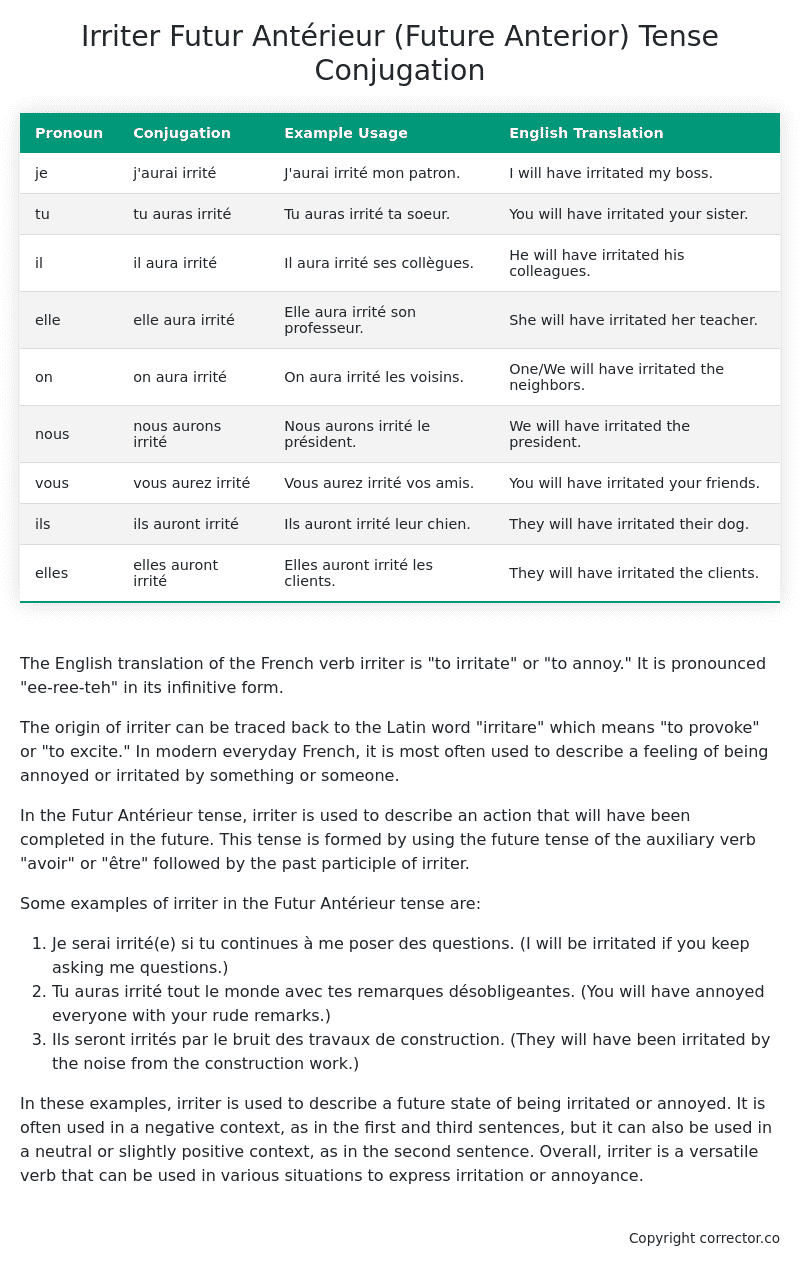Futur Antérieur (Future Anterior) Tense Conjugation of the French Verb irriter
Introduction to the verb irriter
The English translation of the French verb irriter is “to irritate” or “to annoy.” It is pronounced “ee-ree-teh” in its infinitive form.
The origin of irriter can be traced back to the Latin word “irritare” which means “to provoke” or “to excite.” In modern everyday French, it is most often used to describe a feeling of being annoyed or irritated by something or someone.
In the Futur Antérieur tense, irriter is used to describe an action that will have been completed in the future. This tense is formed by using the future tense of the auxiliary verb “avoir” or “être” followed by the past participle of irriter.
Some examples of irriter in the Futur Antérieur tense are:
- Je serai irrité(e) si tu continues à me poser des questions. (I will be irritated if you keep asking me questions.)
- Tu auras irrité tout le monde avec tes remarques désobligeantes. (You will have annoyed everyone with your rude remarks.)
- Ils seront irrités par le bruit des travaux de construction. (They will have been irritated by the noise from the construction work.)
In these examples, irriter is used to describe a future state of being irritated or annoyed. It is often used in a negative context, as in the first and third sentences, but it can also be used in a neutral or slightly positive context, as in the second sentence. Overall, irriter is a versatile verb that can be used in various situations to express irritation or annoyance.
Table of the Futur Antérieur (Future Anterior) Tense Conjugation of irriter
| Pronoun | Conjugation | Example Usage | English Translation |
|---|---|---|---|
| je | j’aurai irrité | J’aurai irrité mon patron. | I will have irritated my boss. |
| tu | tu auras irrité | Tu auras irrité ta soeur. | You will have irritated your sister. |
| il | il aura irrité | Il aura irrité ses collègues. | He will have irritated his colleagues. |
| elle | elle aura irrité | Elle aura irrité son professeur. | She will have irritated her teacher. |
| on | on aura irrité | On aura irrité les voisins. | One/We will have irritated the neighbors. |
| nous | nous aurons irrité | Nous aurons irrité le président. | We will have irritated the president. |
| vous | vous aurez irrité | Vous aurez irrité vos amis. | You will have irritated your friends. |
| ils | ils auront irrité | Ils auront irrité leur chien. | They will have irritated their dog. |
| elles | elles auront irrité | Elles auront irrité les clients. | They will have irritated the clients. |
Other Conjugations for Irriter.
Le Present (Present Tense) Conjugation of the French Verb irriter
Imparfait (Imperfect) Tense Conjugation of the French Verb irriter
Passé Simple (Simple Past) Tense Conjugation of the French Verb irriter
Passé Composé (Present Perfect) Tense Conjugation of the French Verb irriter
Futur Simple (Simple Future) Tense Conjugation of the French Verb irriter
Futur Proche (Near Future) Tense Conjugation of the French Verb irriter
Plus-que-parfait (Pluperfect) Tense Conjugation of the French Verb irriter
Passé Antérieur (Past Anterior) Tense Conjugation of the French Verb irriter
Futur Antérieur (Future Anterior) Tense Conjugation of the French Verb irriter (this article)
Subjonctif Présent (Subjunctive Present) Tense Conjugation of the French Verb irriter
Subjonctif Passé (Subjunctive Past) Tense Conjugation of the French Verb irriter
Subjonctif Imparfait (Subjunctive Imperfect) Tense Conjugation of the French Verb irriter
Subjonctif Plus-que-parfait (Subjunctive Pluperfect) Tense Conjugation of the French Verb irriter
Conditionnel Présent (Conditional Present) Tense Conjugation of the French Verb irriter
Conditionnel Passé (Conditional Past) Tense Conjugation of the French Verb irriter
L’impératif Présent (Imperative Present) Tense Conjugation of the French Verb irriter
L’infinitif Présent (Infinitive Present) Tense Conjugation of the French Verb irriter
Struggling with French verbs or the language in general? Why not use our free French Grammar Checker – no registration required!
Get a FREE Download Study Sheet of this Conjugation 🔥
Simply right click the image below, click “save image” and get your free reference for the irriter Futur Antérieur tense conjugation!

Irriter – About the French Futur Antérieur (Future Anterior) Tense
Construction
Common Everyday Usage Patterns
Interactions with Other Tenses
For example
Summary
I hope you enjoyed this article on the verb irriter. Still in a learning mood? Check out another TOTALLY random French verb conjugation!


